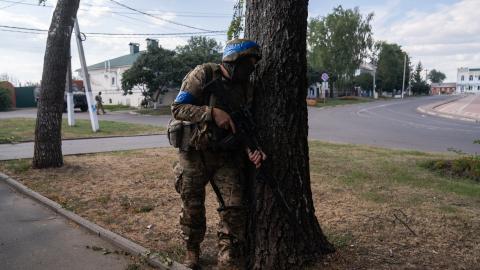Regarding morale, George Marshall once said, “With it, all things are possible, without it everything else, planning, preparation, production, count for naught.” With its bold strike into Kursk, Ukraine’s leadership primarily aims to bolster the morale of the nation and the allied coalition; a gamble which if successful could upend the trajectory of the war.
Facing a relentlessly negative paradigm of grinding trench warfare against an enemy with significant manpower advantages and zero compunction in throwing body after body against hardened defenses, Ukraine commenced a surprise strike meant to shift the battle of esprit in its favor on August 6.
With the offensive, Ukrainian leadership wants to spread hope to the nation; showing that individual and societal sacrifices are not in vain. Ukraine’s civilian population is under constant attack by Russian missiles and faces a difficult winter ahead thanks to Moscow’s campaign to knock out the power grid. The offensive also doubles as a blow against the Kremlin’s messaging internally, ideally weakening Putin’s grip on power.
Videos of Russian prisoners of war (POWs) captured in Kursk expressing how humane treatment has shifted their views on Ukraine is a part of this morale campaign, words which could soften Russian popular support for the regime if they reach their intended audience. Perhaps most importantly, in capturing and holding Russian territory, Ukraine hopes to impact the morale of those nations supporting their fight for freedom by demonstrating an ability to win.
Simultaneously, Ukraine hopes to shatter the effectiveness of Russian escalatory threats by proving them hollow, thus paving the way for an easing of restrictions on the use of Western weapons against targets inside Russia. If seizing Russian territory isn’t the ultimate red line to be crossed, what is?
Already, the offensive seems poised to embolden those NATO allies keen to push the envelope of support even further. The Polish Foreign Minister’s recent statement that he believed it the government’s “constitutional duty” to shoot down Russian missiles over Ukraine on course for Polish territory, is an example of a trend likely to snowball. Unfortunately for Ukraine, the nervousness of the Biden Administration has yet to abate.
Still, Ukraine’s leadership knows the hour on the Biden Presidency is late, in just over four months, new officials will be in charge in Washington. With the Kursk offensive, Ukraine hopes to prove to the next Administration that Kyiv, not Moscow retains the upper hand. Zelensky and his generals no doubt also recognize the strong possibility that the U.S. under either Vice President Harris or former President Trump may push for some form of negotiations next year. Kursk is insurance for this scenario, giving Ukraine territory and POWs to trade in any future talks.
We should not downplay the significant risks Ukraine’s leadership has chosen to run with the offensive. The impending battle for Pokrovsk, a city arguably far more valuable in terms of logistics and productive capacity than any gained in Kursk, will forever haunt the decision, should it fall to Russian forces.
There are tactical reasons for Ukraine’s Kursk offensive, efforts to divert Russian forces from key sectors inside Ukraine, which have been largely unsuccessful, gaining a launch point further east to target facilities and transit links farther inside Russia, which have been successful, but ultimately the decision was made to win the battle of morale. While the definitive wisdom of the Kursk offensive remains to be written, one thing is clear, absent a shock, Ukraine’s leadership saw the battle for morale slipping away and decided to risk an effort to turn the tide.
Read in The National Interest.
Enjoyed this article? Subscribe to Hudson’s newsletters to stay up to date with our latest content.



















